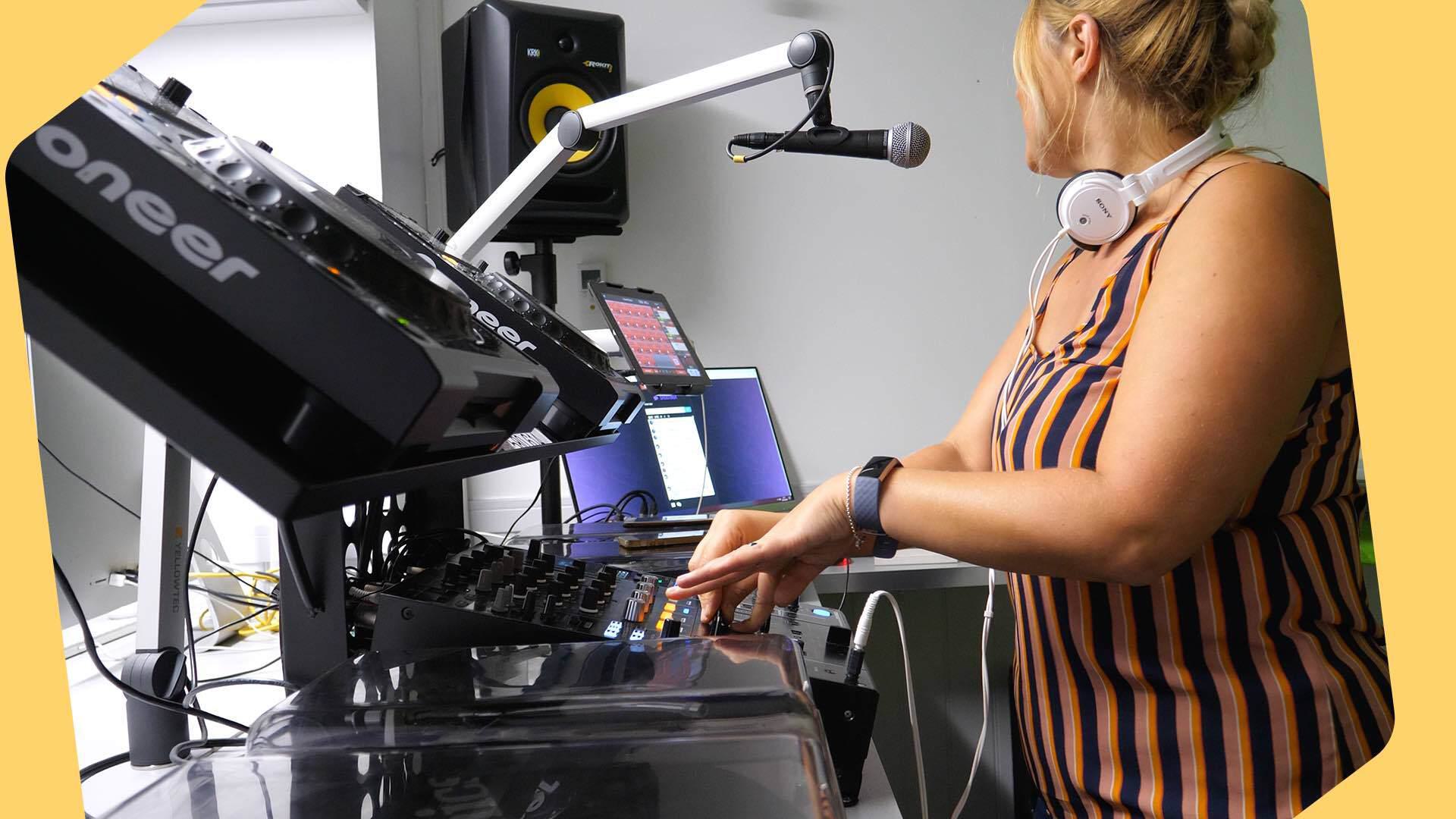Need advice? Let's talk.
Get straightforward guidance from your broadcasting partner. Schedule a call to chat with the team about your radio station.
Book Demo100 Quick Radio Interview Questions to Ask Guests
Get guests talking on your radio show. Ask the right interview questions to kickstart interesting conversations and healthy debates to hook your listeners.
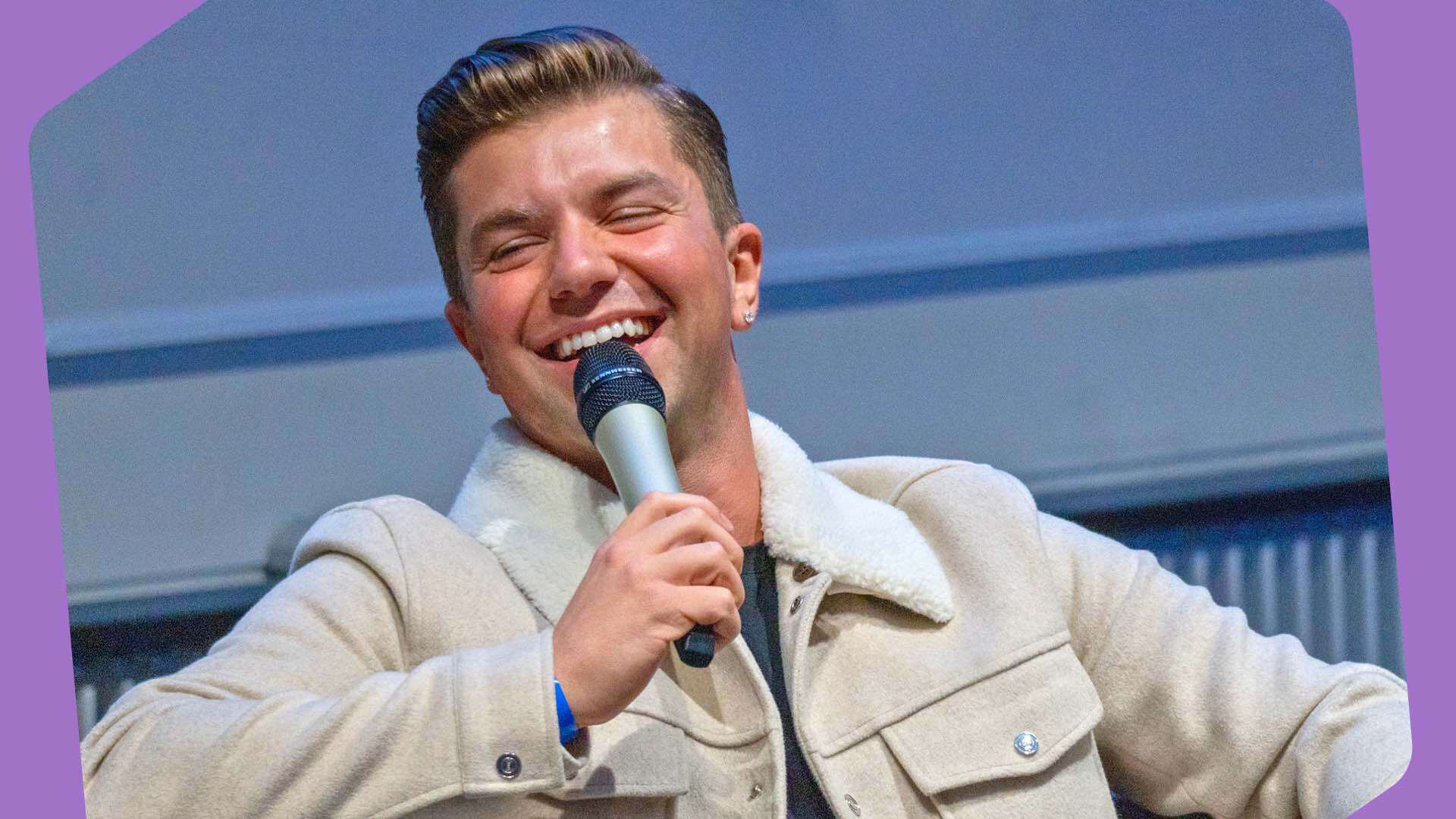
Everyone has a good story to tell. How they tell is up to you. But let's be real for a second, great questions come from research and knowing who you're talking to. So use the following radio interview questions as a jumping-off point.
"Asking the right questions takes as much skill as giving the right answers." - Robert Half
In saying that, the following questions are not ranked in any particular order and offer a general structure as a starting point. My advice? Skim through the questions, jot down the ones that apply to you, and build on them. Hopefully, the outline will help you craft good narratives and encourage healthy debates.
100 Quick Radio Interview Questions to Ask Guests
1. Can you briefly introduce yourself and your background?
Break the ice by getting the guest to talk about themselves. It's often said people are waiting for their turn to talk, so a good jumping-off point is for the guest to lay some foundation on who they are and what they do.
2. What inspired you to pursue your current profession?
Everyone has dreams and aspirations. If you ask any child what they want to be, chances are they'll go big by highlighting well-known and respected fields like doctors, police officers, and lawyers. Although dreams change over time, that spark still burns bright, no matter the profession.
3. What is the most exciting project you're currently working on?
Chances are your guest will have something to sell or promote. Every interview should shift the spotlight onto the guest to highlight what they've been invited to do - that's to use your platform to talk to your listeners. And that's not a bad thing. Just be sure to get what you need, like broadcasting exclusive stories listeners won't be able to hear anywhere else.
4. Can you share any recent achievements or milestones in your career?
Aka a victory lap. Even the most humble of guests won't shy away from talking about their biggest achievements. Most likely their are interesting stories behind those gold medals, so it's worth digging deeper to talk about their journey and how they've got to where they are now.
5. How do you define success in your field?
Everyone has a different definition of what success looks like. If you ask a university student studying mathematical science, chances are they'll say success is a first-class honours degree. But if you asked a vocational student the same question, they might say a job in a well-regarded business. And that's where the interest lies.
6. What advice would you give to someone starting in your industry?
Starting out in any industry is tough. Just look at the radio industry, there are countless people clamouring to get a foothold as a presenter, producer, or sound engineer. For those that have made it, ask how they got to where they are and what that journey looked like, warts and all.
7. Can you share a memorable experience or story related to your work?
Getting locked in the office bathroom, accidentally emailing the entire company, or just juicy gossip all make for 'edge of your seat' listening. Although your guest might be embarrassed, it's your job to put them at ease to tell their story, even if it has you in hysterics.
8. What challenges have you faced in your career, and how did you overcome them?
Not everything is smooth sailing. Bumps along the road make for interesting stories. More importantly, how guests overcame those challenges is the most compelling part. No one wants to hear a sad ending, but a happy triumph.
9. How do you stay motivated and productive?
Mondays, amma right? Days often turn into weeks, then weeks turn into months. The hum-drum of life without variation can be rather boring. But what motivates us to stay at our best gives others ideas to inject some life back into their daily lifes.
10. What are the key qualities or skills needed to excel in your field?
Electricians need to know electronic equipment, whilst professional footballers need skill and endurance on the field. The point is, every industry has key qualities that make people stand out. What those are is the most fascinating of all.

11. How do you approach problem-solving in your work?
I once saw a person eating a pizza with a knife and fork. My mind was blown, but it got me thinking. There's always more than one way to solve a problem. Even if it's not obvious or taboo (I'm looking at your knife and fork pizza man), it's a different way of thinking.
12. Can you share any lessons you have learned from failure or mistakes?
As the one-hit wonder Chumbawamba once sang: "I get knocked down, but I get up again". As toddlers, we've all had our fair share of mistakes. But those trials and tribulations are much grander as we get older. In adulthood, those lessons shape us. Often when shared, those stories influence others.
13. What does your creative process look like?
Method acting is the process of going deep into character. So much so that your own personality takes a backseat. Daniel Day-Lewis, the world-renowned actor famous for Gangs of New York, There Will Be Blood, and many other award-winning films is regarded as a deep-method actor that doesn't break character until the film ends. My point? Every creative has a fascinating process worth peeling back the layers.
14. How do you handle criticism or feedback?
Being told you're bad at something often feels personal. Like an attack on your identity. How you handle criticism is another thing entirely. Taking onboard and shaping feedback defines who we are. Sometimes, that can lead to conflict and at the very best, a funny story.
15. Can you share any interesting trends or developments in your industry?
As times change, so do best practices and processes. No industry is immune. Even in radio as traditional broadcasting shifts to the digital age to DAB and online, there are new challenges to face. So every guest will have a unique perspective and their own thoughts on that revolving door.
16. What are some common misconceptions about your profession?
They say that the Great Wall of China is the only man-made object visible from space. That's a common misconception. Many things like motorways and even building infrastructures are visible from past the earth's atmosphere. Untruths are a common occurrence, so much so that any guest will be happy to correct.
17. How do you stay updated and informed about new developments in your field?
Social networks like LinkedIn, newsletters, and even word of mouth are all ways people stay in-tune with their industry. But guests will have a preference, and for those looking for advice on how they can stay in the know, that info is gold.
18. Can you share any upcoming projects or collaborations?
Things to come are often exciting. Details often weigh down good ideas, but untethered projects near the starting line make for exciting announcements to get others involved or to simply show off what guests are working on next.
19. How do you balance your personal and professional life?
Just like walking a tightrope, balancing personal and professional can be tricky. Some prefer to keep the two apart, whilst others marry them up (in some cases, literally as is often the case when onscreen actors become partners). Whichever side of the fence guests land on, there's probably good reasoning behind the decision.
20. What role does networking play in your career?
Industry people tend to mix in similar circles. Those are often at networking events. Close to home, the Radio.co crew have been to many events to get to know the broadcasting industry like the Radio Academy, Student Radio Conference, and Radiodays Europe. All decent places to network and to get to know similar like-minded people.
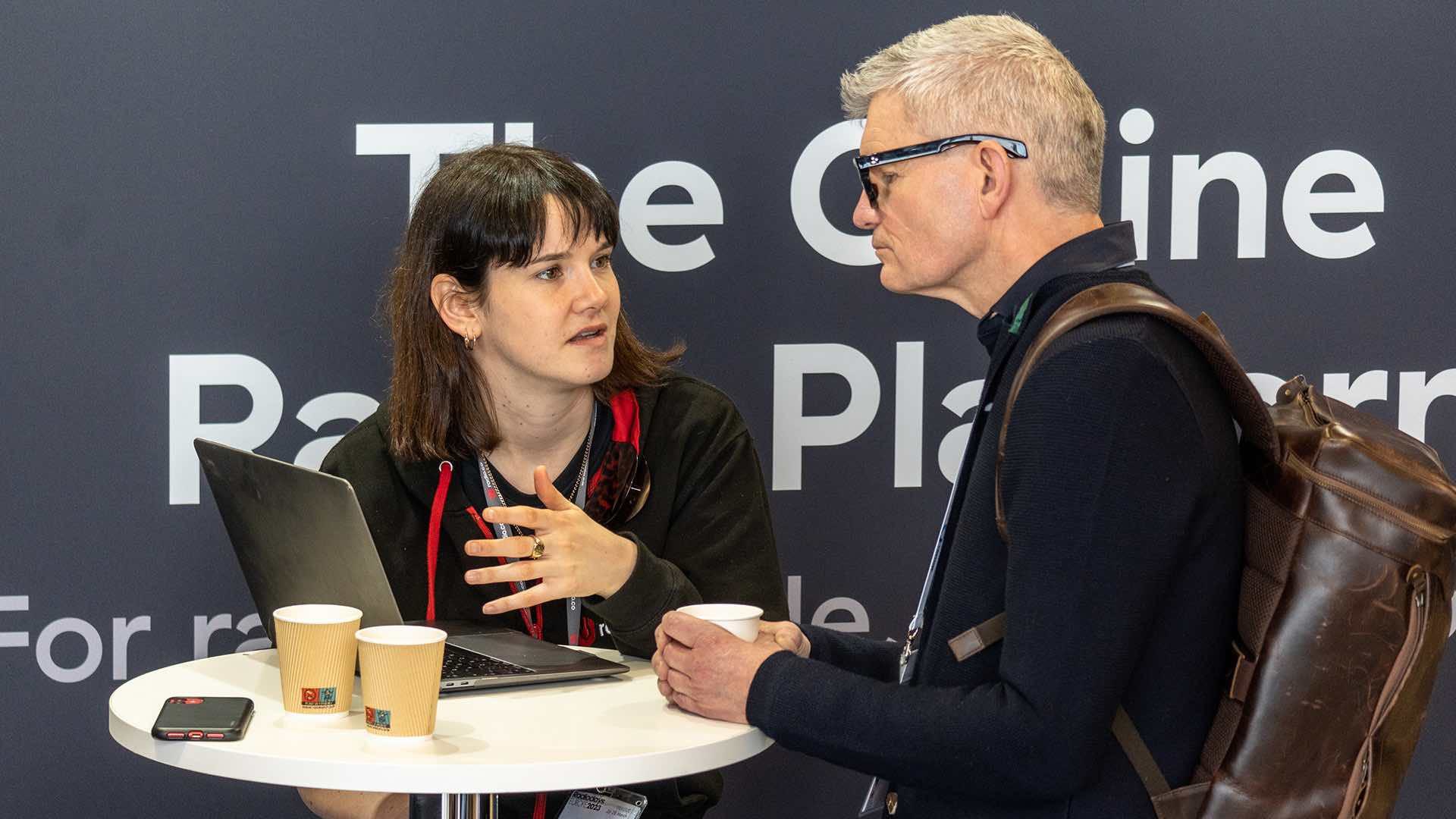
21. Can you share any success stories or testimonials from your clients?
Positive accolades paint a better picture then your guest ever could. Testimonials and success stories give us more perspectives, rather than just one person boasting about how good they are. If your guest has those in their back pocket, chances are they'll happily share them.
22. What is the biggest challenge you see facing your industry in the future?
With the rise of AI, every industry is feeling the impending challenges that will shape the next decade or so. Even creative industries in the media aren't safe, but other micro changes are also going on in the background. Guests will know all the juicy details if prodded.
23. How do you think technology has impacted your field?
Story time. In the 19th century, cart and horses were the primary way for people to get from A to B. But after cars became the defacto way to travel from the 20th century onwards, businesses that didn't adapt to this new technology were soon left behind. Although old, but fascinating, there are countless more stories on different levels about the impacts technology has in their industry.
24. Can you describe a typical day in your professional life?
An oldie but a goodie. The 'day in the life' question is always a good starting point, but it opens up avenues to ask follow-up questions. The main challenge is keeping the guest on an interesting path so as to not bore listeners. So the best piece of advice is to interject (but not in a rude way) to keep things spicy.
25. What motivates you to keep pushing forward in your career?
Family, money, and being the best are just a few motivators that might drive your guests. Discovering what makes them tick opens up additional talking points to drive your interview forward.
26. Can you share any mentors or role models who've influenced you?
And I don't mean social media influencers. But rather someone that your guest might look up to as a leading figure or icon within their industry. Computing had Steve Jobs and theoretical physics had Stephen Hawking. All leading innovators challenged the status quo and influenced their respective fields. So find your guest's Stephen Hawking.
27. How do you approach time management and prioritize tasks?
Have you ever noticed time seems to move much more quickly on the things you enjoy, but slower on the things you don't? Ways to manage time and prioritise important tasks are crucial for everyone, not just professionals. But exactly how is another matter entirely.
28. What are some strategies you use to handle stress or pressure?
Stress is a normal part of life. Finding the right balance to stop stress from becoming too much is vital long term. Whether that's buying a squishy stress toy, taking the dog for a walk, or even listening to Queen's 'Under Pressure', guests have their own ways to deal with stressful situations.
29. Can you share any upcoming events or conferences in your industry?
If there's enough money floating around, no doubt there will be a networking event. If your guest is the social type, then they'll probably be going, promotion hat and all. So if nudge, they'll be more than happy to let your listeners know about upcoming dates and where to catch them.
30. How do you define innovation, and how does it play a role in your work?
People are always looking for ways to break new ground. Your guest might not redefine the wheel, but they could be a leading innovator in their own niche market. If that's the case, they'll know all about how their work will impact others, including their own.

31. Can you share any challenging projects you've worked on?
It's one thing talking about successful projects, and another to talk about those that flopped. But failing is part of the process. Although your guest might be reluctant to talk about a difficult topic, listeners love underdog stories. Those that tell a good journey with lessons learned along the way.
32. What are your thoughts on the future of your profession?
Professions change over time as new practices and standards have a ripple effect. In the medical profession, doctors and nurses need to know the correct ways to perform operations, types of dosages for medicines, and plenty of other nuisances to do their job effectively. The same applies in every other field, no matter how slow (solicitors) or fast (technology) the profession.
33. How do you embrace diversity and inclusivity in your work?
Roll the clock back 100 years. Before 1928, women weren't allowed to vote in the UK. In the US, until the Civil Rights Act of 1964 all states and local laws could enforce segregation. It's only recently in the past century that first-world countries are becoming more inclusive and diverse. But every culture is different with a rich heritage worth diving into.
34. Can you share personal habits or routines that contribute to your success?
Arnold Schwarzenegger is best known for blockbuster films in the 1980s and 1990s with the likes of Terminator and Predator. But before his rise to Hollywood (then success in later life with a political career), the 6ft 2inch Austrian powerhouse was once an avid bodybuilder.
You need discipline until your routine is so automatic that you never think about it.
Winning countless trophies and accolades, he put his early success down to a good routine whilst training to win Mr Universe. Just like Arnold, we all have habits that shape how we behave.
35. How do you continue learning and growing in your field?
It's often said that "we learn from failure, not from success". The best radio interview questions are those that make the guest vulnerable, yet powerful. Even if they falter, their field has teachable moments to grow and share experiences with others.
36. Can you share any success stories from individuals you have mentored or helped?
As we grow and take on more responsibility, like becoming a partner, parent, or boss, we also take on the role of mentor. Whether that's to 1 or 100 people makes little difference. Everyone has their own success story to tell like how they helped a loved one through a difficult time or encouraged their employees to flourish.
37. How do you overcome self-doubt or imposter syndrome?
Imposter syndrome is feeling like you don't deserve rewards, constantly doubting your own abilities. That feeling often doesn't go away. But guests will probably have ways of how they squash any self-doubt to feel better.
38. What is your approach to building strong professional relationships?
When the pandemic hit in 2020, most people went remote. Being miles away from one another meant professional relationships were more difficult to form. But we adapted. Guests will have their own tricks to form strong bonds, both from afar and with those close by.
39. Can you share any inspiring quotes or mantras that keep you motivated?
Mantras trickle through in everyday life, often to uplift and empower like "I am capable of achieving great things" or "I am worthy of love, respect, and abundance". But quotes have a more direct cut-through, like from American writer and host Sam Levenson.
Don't watch the clock; do what it does. Keep going.
Ask your guest what they've heard that's stuck with them to stay motivated and keep going.
40. How do you encourage creativity and innovation within your team?
Ever heard the saying "Do as I say, not as a do"? The best leaders don't bark orders at their team, but rather lay a solid foundation for others to grow. Innovation only happens when people feel comfortable, looking to leadership for the right path.

41. Can you share any advice for aspiring professionals in your field?
In radio, everyone is looking for a job. In-demand or sought-after fields attract attention, so there's bound to be some good advice your guest can share for their respective field.
42. What are some strategies you use to communicate effectively with your team?
Teams are filled with introverts and extroverts. Those that like flourish in noisy crowd environments, whilst others prefer more solitary quiet places. The chances of having one or the other are slim, so a strategy is needed to accommodate both. Like company retreats with group team building, but also small breakout sessions to form bonds.
43. How do you handle setbacks or failures in your career?
Failing is a natural part of life. Getting hit, but keeping moving is key. Your guest might want to dwell on how they cope, like:
- Embracing a growth mindset.
- Taking time to reflect.
- Seeking support and feedback.
- Taking action and persevering.
- Setting new goals, planning ahead.
Setbacks are not defining moments, but rather opportunities to grow.
44. Can you share any notable achievements or milestones in your personal life?
At each point in your life, you'll have a personal achievement worth boasting about. Students want to frame their degree, new parents want to share baby photos, and businesses will plaster every accolade and award to their prospects. Guests will have something they want to share as well, like a new book, an event they're attending, or just a good cause worth attention.
45. How do you maintain a healthy work-life balance?
Burnout is real. Now more than ever a healthy balance between work and personal is needed. Or as the enigmatic Dolly Parton once said:
Workin' 9 to 5, what a way to make a livin'
But finding a balance can be tricky with ubiquitous tech. Your guest will most likely have a hidden trick up their sleeve to help keep them sane, even in busy periods.
46. What is the most rewarding aspect of your work?
For some, the reward is at the start. Planning and executing an idea. For others, that's the end result like delivering a finished product to clients. Everyone has a rewarding aspect of what they do, even if that's just putting a smile on their colleagues' faces.
47. Can you share any unique or unconventional approaches you use in your profession?
Everyone loves a maverick, right? The late Stanley Kubrick was well-known for being a difficult director to work with. Perfect shots and countless reshoots during filming were unconventional, but can be trying for even the best actors. Just ask Shelley Duvall on The Shining after her 35th take. Your guest might have their own unique approach worth sharing, even if it might be considered harsh.
48. How do you foster a positive and inclusive work culture?
Unhappy people won't deliver their best performance. Fostering a positive and inclusive work culture sets a good environment. But what that looks like depends on the work and workplace.
49. Can you share any upcoming projects or initiatives you are excited about?
Everyone is looking ahead. Your guest's next project is extremely exciting, filled with possibilities of what can be. With enough prodding, they might share exclusive newsworthy stories listeners won't hear anywhere else.
50. What impact do you hope to make through your work?
That's the real question. For veterinarians that's caring for pets in need, whereas a hedge-fund manager might see that end-of-year bonus as their goal post. Whatever your guest might say, it gives you a closer look inside their psyche of what they value.

Watch a Round up of the 20 Best Questions
With enough charm, charisma, and a pocket full of decent questions, you can win over just about anybody and spark interesting conversations. But quite frankly, a list of 100 radio interview questions to ask guests is daunting. So we've condensed them down into the top 20 interview questions.
51. How do you approach decision-making in your career?
Would you consider yourself an emotional or factually driven person? That's the difference between how you arrive at conclusions. Guests might share interesting ways they make decisions, like how they gather information, weigh options, analyse and prioritise, and finally take action.
52. Can you share any resources or books that have influenced you?
Changes come in all shapes and sizes. Books like Charles Darwin's 'The Theory of Evolution' shapes how we view world history. Whereas Nir Eyal's 'Hooked: How to Build Habit-Forming Products' teaches us the psychology of why we act the way we do. Big or small, books or Twitter threads, guests will have their own stories to share on what influenced them.
53. What role does teamwork play in your profession?
We all work within teams in one form or another. Doctors and nurses on wards, solicitors and underwriters on case files. Some need high-level communication whilst others just need a check-in every so often. Whatever the case, ask your guest to share anecdotes of how working within a team went well (and didn't go well).
54. How do you handle conflict?
There's an old saying "Never go to bed angry". The idea is to deal with conflict before you move on. Ask your guest what words of wisdom they have to share to resolve disagreements.
55. Can you share any important lessons you've learned from your industry?
Resilience, adaptiveness, and collaboration are all great de facto traits to have, regardless of the industry. But a closer look reveals nuances specific to certain fields that are definitely worth unpacking.
56. How do you stay motivated during challenging times?
Every day brings new challenges. Ask your guest how they stay motivated, like setting clear goals, practising self-care, maintaining a positive mindset, or even something as simple as watching a movie with a loved one on the sofa.
57. Can you share any strategies for maintaining a positive mindset?
Never underestimate the power of a positive mindset. The famous late American author and motivational speaker Zig Ziglar once said:
If you dream it, you can achieve it.
Ask questions around this topic as there are loads of tricks that can help others.
58. What is your approach to setting goals?
Ever heard of the SMART framework? It's a way to set goals and stay on track.
- Specific targets help provides clarity.
- Measurable allows progress to be tracked.
- Attainable ensures feasibility.
- Relevant goals to connect to broader objectives.
- Time-bound sets deadlines.
And countless other methodologies litter the internet, but finding the right ones can be tricky. Your guest will most likely have proof to backup what works for them (or at least a funny story on why they don't).
59. Can you share any tips for effective communication?
As a host, you should have this in spades. But everyone is different. Ask your guest what works for them, like active listening, using open-ended questions, or even just being very empathetic and open to your audience.
60. How do you handle a good work-life balance?
Since the pandemic, people have had the luxury to spend more time at home. But that comes with challenges. The biggest is finding a good balance for both work and personal life. When to switch off and time management are the biggest risks in modern-day working life. So ask your quest how they walk the tight rope of work and life.
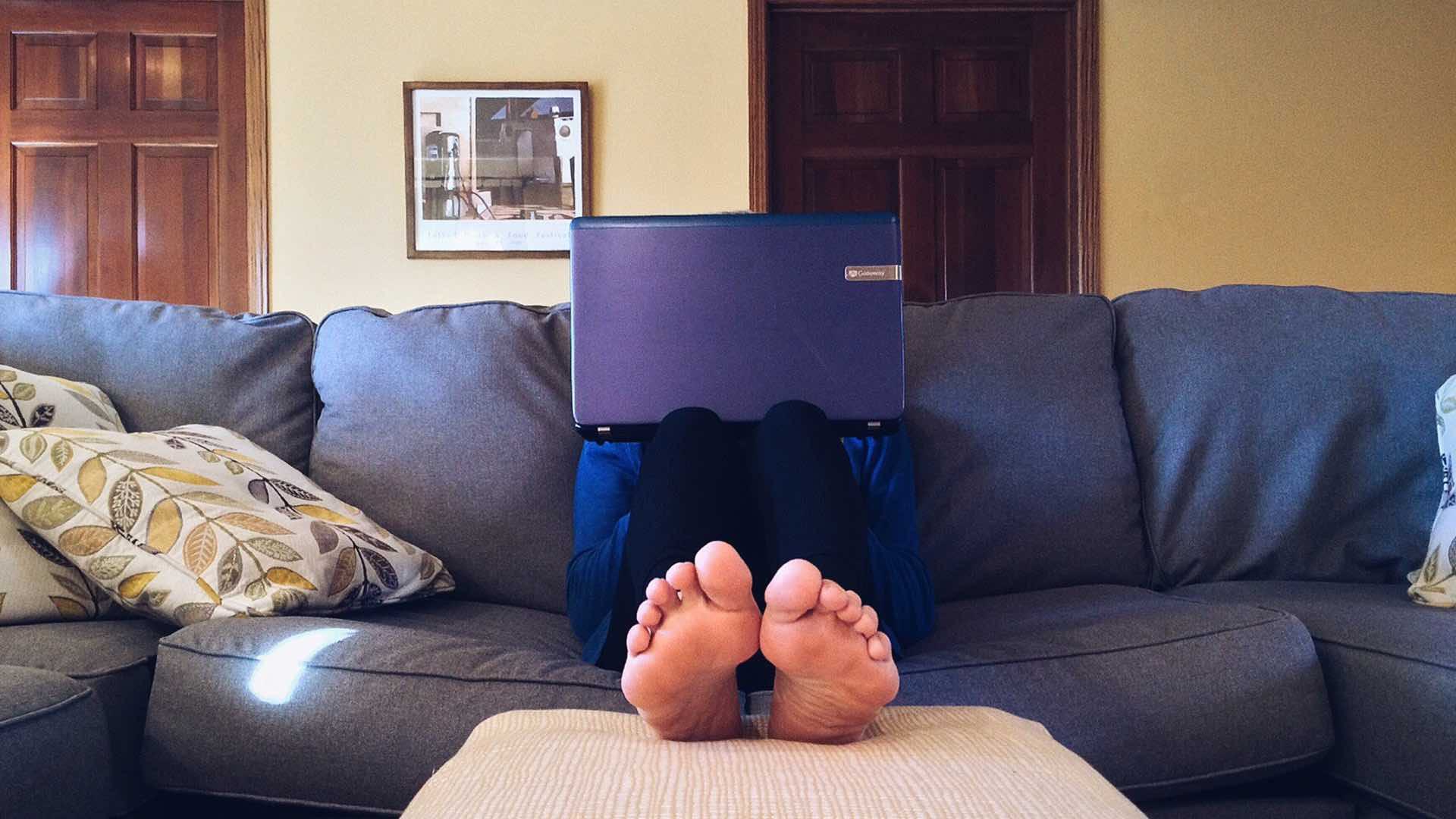
61. Can you share any experiences where you had to think outside the box to find a solution?
James Bond, international spy and man of mystery, has enough gadgets packed up his sleeve to make even the most cutting-edge tech billionaire weep with envy. Although your guest probably doesn't have lasers hidden in their watch, there are other 'outside the box' ways of thinking to solve problems.
62. What role does continuous learning play in your career?
There's an old saying which applies to every living person on the planet:
Change is inevitable.
Standing still for too long can be dangerous, especially in careers that move fast like technology. Even the most seasoned professional knows fields contort to fit the modern age, so it's worth getting your guest to share their experiences and life lessons.
63. How do you foster a sense of teamwork within your organisation?
Teams are often made up of different people. Quiet introverted members prefer silence and a good chunk of time to concentrate, whilst others are extroverted that thrive on debate and open communication on a regular basis. The balance is finding a middle ground.
64. Can you share any philosophies that guide your work?
Ask any competent manager what philosophies they adhere to, and chances are they'll all have good (but very different) approaches to how they work.
- Lead by example, not just barking orders from the back.
- Focus on results and accountability for clear oversight.
- Embrace continuous learning with regular training sessions.
The list goes on. But the perfect radio interview questions ask open-ended questions like this that allow your guest to share their own unique experiences.
65. What steps do you take to adapt to changes and embrace innovation in your field?
Ask what measures your guest puts in place to adapt to change. Forward planning is key. So they might focus on a rigid structure or embrace an agile mindset.
66. How do you ensure that your work aligns with your personal values and ethics?
Values and ethics are the red lines in the sand we don't dare cross. Sometimes, work can get uncomfortably close and even cross those lines, often making us feel ashamed. But aligning work to a good cause, like charities and non-profit foundations, may fit those values. How we go about doing that is another story entirely.
67. Can you share any strategies for effective project management?
Project management, aka how we handle large-scale tasks, can be accomplished in many different ways. Putting aside Gantt charts and agile workflows for a second, guests will have their own ways on how they handle big projects. For example in housing construction, the clear goals and measurable outcomes might be building a certain number of properties to a specific standard. But every industry will have its own strategies and deliverables.
68. What role does empathy play in your interactions with clients or colleagues?
Empathy is a strong ally to have. Not only does it give you a better look into how others behave, but it also helps resolve conflicts, be a more effective communicator, and build stronger relationships.
69. How do you balance creativity with practicality?
Walking the tightrope of the unknown whilst making it feasible for an audience is difficult. Creativity is all about experimentation, but that doesn't always lead to practical applications. The creative industry, like the arts, knows this fact all too well. Take gaming, an industry so competitive that publishers force the hand of developers in terms of narrative and timelines. The trick is to find some middle ground.
70. How do you build a strong personal brand?
A personal brand is about credibility and reputation. That might translate to style, services, or ethos. In the audio industry, people have extended their personal brand to podcasts. Take Cue, a full-service podcasting agency, that builds strong brands for people and businesses alike.
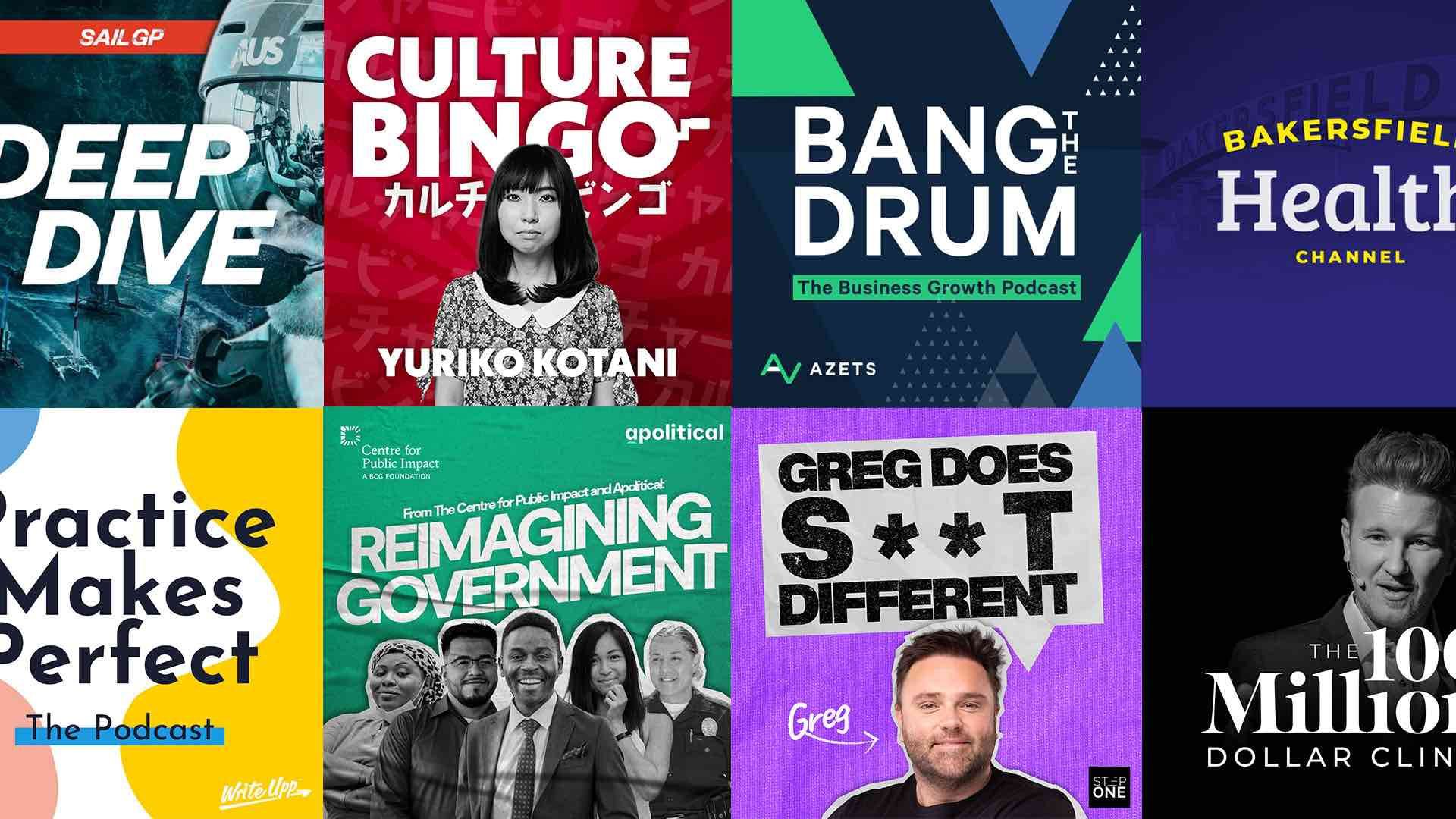
71. What is the most valuable lesson you've learned from a mentor or colleague?
Lessons come in all shapes and sizes. From how to fix a leaking tap to learning compassion for others, great mentors pass down their wisdom. Oprah Winfrey once famously flipped this upside down:
True mentors inspire you to find the answers within yourself.
The most valuable lessons aren't those we seek, but those that find us.
72. How do you incorporate sustainability or environmental consciousness into your work?
Environmental awareness is now mainstream. Meaning people care about their impact on the planet, specifically how sustainable consumption is in the long run. That means different things in different industries, so it's worth asking what your guest is doing to minimise their impact on the environment.
73. Can you share any experiences where you had to overcome a significant obstacle?
Hurdles are just a natural part of life. But it's worth asking your guest how they overcame theirs, including lessons they learned along the way.
74. How do you stay organised and focused in a busy work environment?
Focusing can mean listening to loud music or sitting in a bustling coffee shop. The definition of a good work environment differs depending on who you ask. The same goes for staying organised, so it's worth tieing that question into their more recent work.
75. How do you leverage technology to enhance your productivity?
Technology is now ubiquitous. Smartphones, smartwatches, and smart speakers are all tools to help with the daily grind. Even software tools like Grammarly save us time and increase productivity. But there are a sea of gadgets and services out there worth exploring.
76. Can you share strategies for effective decision-making in high-pressure situations?
CEOs, directors, managers, and team leaders all have to make tough calls. Who to hire, monthly budgets, and overall direction are just a few high-pressure situations. Even team members have to make difficult decisions day-to-day. But staying calm and analytical are a few tricks to keeping a level head.
77. What's your approach to fostering a culture of innovation?
The Austrian-American management consultant, Peter Drucker, was well-regarded as an influential thinker when it came to understanding the role of management. Famously having said:
If you want something new, you have to stop doing something old.
Although Peter Drucker's field was focused on management, following processes and best practices sometimes meant "out with the old, in with the new". Innovation doesn't just happen. So fostering a culture of innovation is key to success.
78. How do you handle work-related stress to prevent burnout?
Burnout is more common as people are more connected. Bosses can message you at the drop of a hat, night or day. So handling burnout is key, like taking regular breaks, knowing when to switch off, and seeking guidance when the pressure gets too much.
79. Can you share how you've adapted to a rapidly changing market?
As markets change, people have to adapt. In energy, fossil fuels and non-renewable energies are heavily taxed to promote renewable energy from places like solar wind farms. The same goes for media, renting videos from Blockbuster was a widely popular way to watch movies, but now it's Max (formally HBO Max), Netflix, Disney+, and loads more.
80. What steps do you take to ensure diversity and inclusivity within your organization?
Diversity and inclusivity encourage a more well-rounded perspective. So it's not just one person's voice taking over the narrative. Depending on their field, your guest will have stories to share about how they're encouraging different types of people to be heard.

81. How do you measure success and evaluate the impact of your work?
Measuring success is difficult as it means different things to different people. But for example, if you're talking to a guest who's promoting an album, they may view success as either how many of their albums are bought (in-store or online), songs streamed (places like Spotify or Soundcloud), or even revenue from sales.
82. Can you share any experiences where you had to step out of your comfort zone?
It's often said comfort breeds complacency. Neale Donald Walsch, an American author famous for the series Conversations with God, once said:
Life begins at the end of your comfort zone.
Getting out of your comfort zone often leads to innovation. That's why we're always looking for ways to improve. It's like the saying "A ship in harbour is safe, but that's not what ships are built for". The same applies to people.
83. What's your approach to building relationships within your community?
Communities exist both in the mainstream and within pockets. Mainstream media like TV, radio, and newspapers are popular destinations we're all familiar with. Outside of that, the same mediums are used to magnify and tailor content to build stronger relationships. Radio stations like Black Sparrow Radio and Foundation FM know their reach isn't in the millions like BBC Radio 1, but championing a community is the goal for stronger bonds.
84. How do you promote a healthy work environment that supports employee well-being?
If your guest is in charge of a team, chances are they'll be actively making sure they're in a good environment. Incentives
- Competitive salary.
- Good benefits/perks.
- Time to learn and grow.
- Open communication.
- Evaluate and adjust goals.
All of which is in the hope of a good work-life balance.
85. Can you share insights on effective negotiation and conflict resolution?
Picturing a hostage negotiator outside a building using a megaphone might leap into your mind when thinking about effective negotiation and conflict resolution. But both happen in microbursts throughout our day. For example, a bus driver might compromise on a fare to let a struggling passenger on. Whatever the case, your guest will have a good story of de-escalation from work (or even at home).
86. What's the most important lesson you've learned from failure?
Failing is the first step to becoming good at something. Ask your guest what lessons they've learned from failure, even if their stories are embarrassing, listeners will get a kick out of some humility and down-to-earth trials and tribulations.
87. How do you stay updated on industry trends and emerging technologies?
Key players within any industry are always throwing their weight around. No matter what field you're in, there will always be 'top dogs' at trade conferences, radio shows, and even in newsletters. Watching an influencer means you can follow their breadcrumb trail to find other sources to stay updated within your industry.
88. Can you share any experiences where you had to make tough ethical decisions?
Journalists have a code of ethics (well, the good ones anyway). The playbook outlines how and why journalists should report honestly, striving for fairness and accuracy to uncover essential facts. But not all journalists follow this to the letter. Making tough ethical decisions may come with the territory for your guest, so it's worth asking what they found challenging and how they dealt with the situation.
89. What steps do you take to build trust and credibility?
According to Edelman, 61% of consumers believe that trusting a brand is more important now than it was in the past. American educator and businessman Stephen Covery once said:
Trust is the glue of life. It's the most essential ingredient in effective communication. It's the foundational principle that holds all relationships.
Trust and credibility aren't easy things to come by. Built over years, but destroyed in an instant, the fragile nature of both is often the winning ingredient for any person, brand, or conglomerate to get cut through.
90. How do you encourage those around you to reach their full potential?
Take joggers. Motivation may come in the form of a running partner, an app to set reminders/daily goals, or just working towards getting fit and healthy. When left alone, people mat not be able to reach their full potential. So different ways of encouragement are needed.

91. What's the one piece of media everyone should experience?
That's anything like film, TV, books, or plays. Today, memes echo those popular pieces of media because they're worth sharing. But get your guest to discuss the original form of media on what influenced them and why.
92. What's the best piece of advice a friend has shared with you?
Advice from close friends hits differently from those outside your inner circle. Friends might not mean to, but they'll share nuggets of useful wisdom that you'll probably take to heart in later life. Ask your guest which piece of advice they cherish the most and which has influenced their choices.
93. How do you bounce back from setbacks?
The satirist and actor Steve Coogan is famous for playing Alan Partridge, a parody of British television personalities. A bottomless well of memes, the character is famous for attempting to make a comeback.
But the point is, I bounced back. People bounce back. Dennis Hopper, Rolf Harris... there are others.
Although pretty funny, guests will have their own hilarious stories to share when things didn't go to plan.
94. What was your most uncomfortable moment, and how did you overcome it?
The MeToo Movement raised awareness against harassment, mainly against young women and vulnerable women of colour. Although shocking, talking and sharing gave people their voices back. In saying that, your guest might not be as open to sharing their own experiences, but it's worth getting the conversation going.
95. What's your favourite restaurant or type of food?
A good ice breaker, asking your guest simple radio interview questions gets the ball rolling. And food is the perfect light snackable question to ask (pun intended).
96. What small act of kindness goes unappreciated?
Holding the door open, saying 'bless you', or making a cup of tea are just a few things that might fly under people's radar. Ask your guest what other small acts of kindness they can't get enough of, but go unvalued.
97. How do you build successful partnerships?
That can be in business, love, and even parenthood. Each one is different of course, but no less important than the other.
98. If you could turn the clock back, what would you do differently?
Everyone wishes they could turn back time. But should you? Henry Ford, an American industrialist and business magnate, once said:
The only real mistake is the one from which we learn nothing.
Popular films and TV often show the repercussions of changing past events. But it's still fun to think how we'd do things differently if given the chance.
99. What comfort can you not go without?
Think delicious food, a good book, or a chilled conversation with a partner at the end of the day. Get your guest to share what they can't live without.
100. Can you share any experiences where you had to lead through a crisis?
When things go wrong, who you gonna call? (I couldn't help myself). Joking aside, its often sink or swim in a crisis. The most difficult moments are those that define us. Deep dive into a time when your guest had to take charge to lead through a difficult period.

Radio Interview Questions in Practice
It's one thing reading and jotting down questions, it's another putting them into practice. Just be sure to structure your questions in a way that flows naturally. A good structure to follow is:
- Opener: Break the ice with soft questions like asking the guest about themselves.
- Deep Dive: The substance of the interview, so ask specific questions early on.
- Fun Times: Weave in quirky or silly questions to balance the serious ones.
- Challenging: As you draw to a close, ask difficult or controversial questions.
- Closer: Wrap up with the guest's promotional material and any loose ends.
Unless you're trying to be the next Howard Stern, it's best to avoid challenging questions. Venturing too deeply into those murky waters can put guests off, which means they're less likely to share post-chat or return in future.
On another note, there are countless good radio interview questions to ask guests. AlsoAsked and AnswerThePublic are useful places to brainstorm ideas. The trick is to use base keywords, springboarding into full-blown questions.
In saying all that, every guest is different. Researching and writing well-thought-out radio interview questions should be your baseline. But the best conversations come from practice. In the words of the ancient Greek tragedian playwright:
"One must learn by doing the thing; though you think you know it, you have no certainty until you try." - Sophocles

